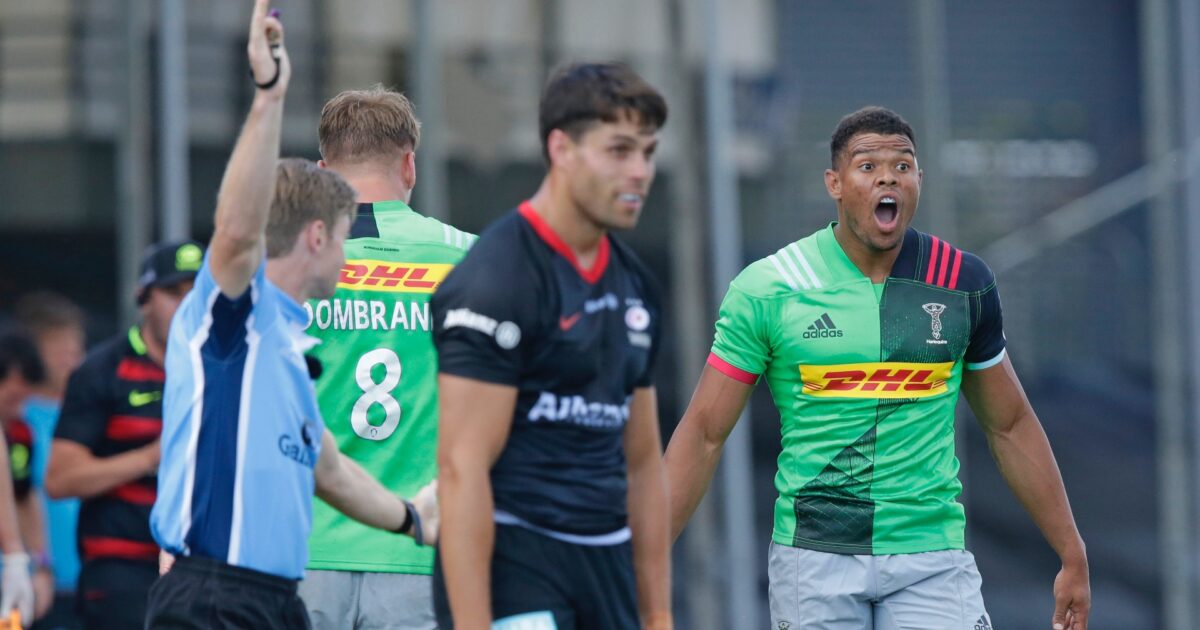Nathan Earle surprises Kyle Sinckler's grassroots club Battersea, telling them they have made the Gallagher Club of the Season shortlist

Harlequins winger Nathan Earle has lauded the role of grassroots rugby in England following the opening of live voting in the six-strong race to become Gallagher Rugby Club of the Season. The title partner of Premiership Rugby, Gallagher began its search last November to find local clubs who are making a significant contribution to their local community, both on and off-the-pitch.
With a particular focus placed on how clubs demonstrated their inclusivity in providing access and opportunities across age, gender, ethnicity and ability, as well as the innovative ways in which they are increasing participation in the sport at a grassroots level, that hunt has now been whittled down to a shortlist of six.
Each of the finalists have been paired with a Gallagher Premiership Rugby club from their region and rugby fans up and down the country can now vote for their winner from Battersea Ironsides (Harlequins), Erdington (Wasps), Haringey Rhinos Ladies (London Irish), Kingsbridge (Exeter Chiefs), Longlevens (Gloucester) and Trafford MV (Sale Sharks).
With Harlequins paired with up Battersea, the grassroots outfit of England and Lions prop Kyle Sinckler, fit-again winger Earle delivered the exciting news to the club that they had made cut and would be included in the vote to decide the Gallagher Rugby Club of the Season.
“It was a shock more than anything,” said Earle to RugbyPass about the reaction on Zoom after he had told Ironsides they had made the final six. “It was a surprise to them but it was really good.
“They had a really good, productive interview and they asked me some good questions as well, stuff like what was my rugby journey growing up and how I got to where I am. I explained all that and it was nice to open up as not many people know the start to my career.”
Ironsides were selected for the final vote due to their “strong ethos of inclusivity across the South-West London community, including financial support to remove barriers that would otherwise prevent local young people participating; growing its ladies squad from zero to more than 70 in less than four years; and its rugby-based intervention work with prisons and young offenders’ institutes, including encouraging players to get involved in coaching sessions at Wormwood Scrubs”.
For Earle, the opportunity to deliver the good news to Battersea was something he jumped at as grassroots rugby remains close to the soon-to-be 26-year-old’s heart despite being a long time in and around the pro game, having initially linked up with the Saracens academy at the age of 14 before his 2018 switch to Harlequins.
“My mum is still bookkeeper of my local club, Cranbrook,” he enthused. “She gets me down, cracks the whip, ‘You need to get down, you need to get down to see everyone’. So I still quite often to my local club. If mum cracks the whip I have got to go.
“It’s good. We have had a few professionals. Ruaridh McConnachie was Cranbrook as well and so is Harry Sloan, so we all get down every now and then when we can,” he continued, adding that maintaining the link between amateur and professional levels is most important in the current era.
“It’s massive. As long as the professional game can still have a connection to the amateur one, rugby can only go from strength to strength. The fact is that we still have an interest in amateur rugby as every professional rugby player has been an amateur at some point.
Voting for the inaugural Gallagher Rugby Club of the Season is now open, recognising grassroots clubs that demonstrate their contribution to their community, both on and off the field. Register your vote now before 13 September. T&Cs apply.#GallagherRCOTS
— Gallagher UK (@GallagherUK) August 27, 2020
“Rather than professional football, where kids get picked up and go into academies at nine, ten, eleven years old, it’s completely different in rugby as most of your rugby is done at your local club.
“I has so much fun playing rugby. It wasn’t serious too soon. I was able to enjoy it. I still enjoy my rugby but it was just me and my friends messing around on a Sunday morning rather than it becoming a job because as soon as its starts getting serious around 15, 16 years old in an academy, you have to make those sacrifices whereas before then it’s just you and your mates messing around on a Sunday.”
* All of the Gallagher Rugby Club of the Season finalists have received a Gilbert training bundle worth £1,000 and will enjoy an exclusive ‘Train with your Heroes’ session, as well as a free business consultancy session delivered by Gallagher’s risk management and insurance specialists when safety conditions allow. The voting to decide the overall winner has now gone live (click here) and the voting lines will close on September 13.




























